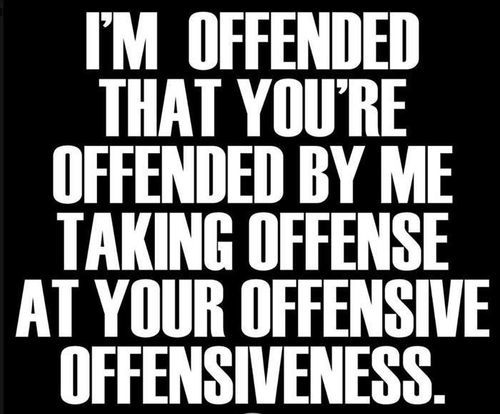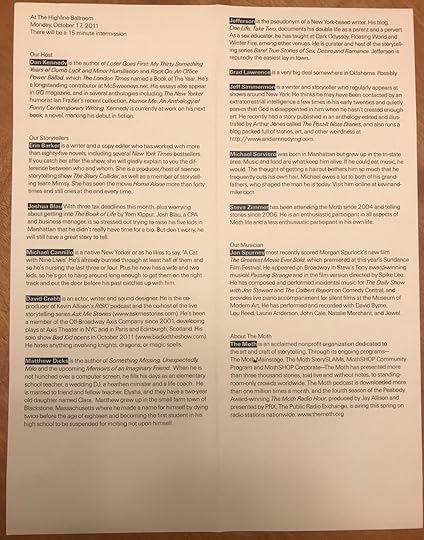Matthew Dicks's Blog, page 186
September 12, 2019
21 + 3 Parenting Truths
Behold! My list of 21 + 3 truths about parenting.
If you find any item on my list offensive, insulting, or somehow unfairly critical of your own parenting decisions, please remember that although I refer to these items as truths, the only real truth is that this is just a list of my opinions about parenting.
I won't be coming to your home to impose my will upon your children or your parenting style.
This doesn't mean you can't disagree. I love a lively debate. Just don't go flying off the handle or getting your knickers in a bunch.
If you feel your knickers beginning to bunch, please refer to truth #21 on the list.
_______________________________________________________
21 +3 TRUTHS ABOUT PARENTINGThe parent who assumes the tougher position in regards to expectations and discipline is almost always correct.
Almost every child behavior is temporary. Remembering this is key to avoiding frustration.
Almost every temper tantrum can and should be ignored.
The calmer the household, the calmer the child.
Avoid becoming emotionally attached to your child’s inappropriate behaviors whenever possible. They are almost never about you.
There are extremely few critical and uncorrectable mistakes that you can make with your child.
With exceptions, training your child to fall sleep on her own in her own bed and sleep through the night takes about 2-4 weeks if done with tenacity, an iron will, and an absolute adherence to the advice of experts. Parents must also possess the grudging acceptance that thunderstorms, nightmares, daylight savings time, and illness will upset the apple cart from time to time.
You cannot take too many photographs of your child.
Despite their size, it’s almost impossible to impose your physical will on any toddler without risking harm to them. Find another way.
Reading to your child every single night without exception is an easy but critical critical commitment that every parent must make.
Changing a diaper is not a big deal and is never something worthy of whines or complaints.
Toddlers will invariably have a million things to tell you as soon as you begin an important telephone call. Lock yourself in a room or go sit in the car before dialing.
Experienced parents always know which toys are best.
Toddlers cannot distinguish between a new toy and a used toy. Accept all hand-me-down toys with gratitude, knowing they were once well loved and can be loved again.
Unsolicited advice from experienced parents should always be received with appreciation. Wisdom of any kind is valuable. It should not be viewed as a criticism or indictment of your own parenting skills and can be easily ignored if need be.
There is absolutely no reason for a child under eighteen months-old to be watching television on a daily basis.
Consignment shops are some of the best places to find children’s clothing and toys unless you are a pretentious snob.
Parents seeking the most fashionable or trendy stroller, diaper bag, and similar accouterments are often saddled with the least practical option.
Little boys and little girls are entirely different animals. They have almost nothing in common, and it is a miracle that they might one day marry each other.
The ratio of happy times to difficult times in the first four years of your child’s life is about one billion to one. Some parents have an unfortunate tendency to forget the billion and accentuate the one.
Parents are often far too sensitive about all opinions on parenting that differ from their own.
I’ve also separated out three rules out that are closely interconnected and exceptionally important for expecting parents and the parents of newborns to understand.
Taking care of a child during the first four years of life is not nearly as difficult as many people want you to believe.
Telling people that raising your child has been an easy and joyous experience will often annoy them. Do it anyway.
Experienced parents who are positive, optimistic, and encouraging to the parents of newborns are difficult to come by and should be treasured when found.

September 11, 2019
Grapes and novels: New ways of prying money away from the wealthy
Business idea:
The manager of a chain of hotels in Japan recently spent 1.2 million yen, or roughly $11,000, for 24 grapes.
It sounds crazy, but expensive, specialty-grown fruit of unique appearance or intense taste is a trend in Japan, used as gifts, or in this case for promotional purposes, Guest at the hotels will be able to eat one of the grapes for about $460.
The specific variety — Ruby Red — first came to market in 2008, and about 26,000 will be sold this year. The expensive, but perfectly unblemished and flavorful fruit is one way that small farms are able to compete against the enormous agricultural companies.
Okay, that’s their business idea, which I like a lot. Rich people like things that are exclusive, innovative, interesting, and entertaining – as well as things that are rare, unusual, valuable, and otherwise desirable. There are a lot of wealthy folks looking to spend money on unique experiences who have already spent ridiculous amounts of money on items designed to set them apart from the masses:
Bottle service. Hand-crafted furniture. Custom-build automobiles. Ostrich coats. Six-figure handbags. Wine cellars.
Why not take advantage of this market by pricing a single grape at a $500?
Now for my business idea:
Single edition short stories or novels. Stories written for a single buyer that no one else will ever see.
A novel written for your eyes only.
Admittedly, a part of me would be devastated by the thought that I might write an entire novel that only one human being could ever read, but that devastation could be significantly mitigated for the right price. If I could send my two kids to college for the price of a book or upgrade to a larger, mortgage-free home for a single story, I think I could find a way to let one story disappear onto the bookshelf of a single reader.
Single edition novels:
Brilliant idea? Artistically-bankrupt idea?
I think it depends on the price.

September 9, 2019
Offense kleptomaniacs
Someone recently introduced me to a term that I like a lot:
Offense kleptomaniacs
These are people who - no matter what was intended - will take offense, often unjustifiably.
You say one thing. They hear another.
You do one thing. They see another.
In my life, offense kleptomaniac often lift their ugly heads when I find a corner to cut, an advantage to seize, an opportunity to snag, or a new road to take. They become angry and outraged because I saw something before they did or I had the courage or daring or insight to try something that initially seemed dangerous or unexpected or unwise or against the rules.
I take an unanticipated step forward. They see it as me shoving them back.
Many years ago, when a large-scale initiative was first introduced at our school, I quickly put together my own team of teachers - all close friends who shared a similar skill set and who I enjoyed working alongside- before administration could assign teams. Then, as teams were being considered for the initiative, I presented our already-assembled team to administration and asked that it be allowed to stand.
It was.
Offense kleptomaniacs - people who could’ve done the same thing and still could’ve done the same thing after discovering what we had done - took this maneuver as a slight. An injustice. An outrage.
“How dare they assemble their own team?”
”No one said we could pick our teammates!”
”Why do they get to choose their teammates but we don’t?”
”Who do they think they are?”
Rather than seeing this for what it was - a colleague spotting a previously unseen opportunity and seizing it - they took offense to it. They saw it as someone taking advantage at their expense. They spun their wheels in anger and disgust. Grumbled and growled and cried foul instead of seeing it as a possible path for them to take, too.
Yes. I know these people. You probably do, too.
Also, I despise these people. I look forward to using this new phrase when dealing with them.

September 8, 2019
Many traditions are kind of stupid. Some are epically stupid.
Residents in the town of Nejapa in El Salvador have been commemorating a volcanic eruption in 1658 which destroyed the town by hurling fireballs at each other.
Yes, that’s right. Residents take to the streets with gasoline-soaked rags and hurl them at one another.
Check it out.
If you like this video, go to YouTube. There are many more. Each is equally terrifying.
The annual event has been a tradition since 1922, and the fireballs are said to represent the local Christian saint, Jeronimo, fighting the devil inside the volcano with his own balls of fire.
Is it culturally insensitive for me to say that this is a very stupid tradition?
I understand that lots of traditions are kind of stupid in that they are illogical, inane, or represent some truth from hundreds or thousands of years ago that is no longer the case. When viewed objectively, many traditions - both religious and cultural - make little sense.
I get that.
But when you’re throwing fire at another human being and allowing fire to be hurled at you, I think we’ve move beyond the realm of quaint or outdated or nonsensical and into the realm of epically, historically, supremely stupid.
If that makes me culturally insensitive, so be it.
Then again, I also stand firmly against the traditions of female genital mutilation, cannibalism, bullfighting, and all traditionally patriarchal institutions and customs of any kind (I’m looking at you, Catholic Church amongst many others).
Also two stupid traditions that I have written about before:
Spain’s baby jumping and Vrontados’ Rouketopolemos, the tradition in which two rival church congregations in the town perform a "rocket war" by firing tens of thousands of home-made rockets across town, with the objective of hitting the bell tower of the rival church
All of those traditions are epically stupid, too. Far stupider and more dangerous and destructive than most.
I don’t think it’s culturally insensitive to identify certain traditions and customs as stupider than others, and I’d like to think that fireball throwing makes that list.
September 7, 2019
Why are they wearing makeup?
I was watching the first NFL game of the season on Thursday night - Green Bay versus Chicago - happy to see that football was back at last.
As the network returned from commercial at the beginning of the second half, the cameras focused first on the two booth announcers - legendary commentator Al Michaels and former NFL receiver Chris Collinsworth - and then onto their sideline reporter Michelle Tafoya.
As I watched, something occurred to me:
Michaels and Collinsworth were wearing makeup. I could see it as clear as day.
And Tafoya was wearing a lot of makeup. A ton of makeup. Her face looked like it had been painted onto her head.
For years I’ve been told that makeup is required when you appear on television. Some combination of the lights and camera require it, but then it occurred to me:
None of the players of the field - many of whom are the object of constant, intense close-ups, wear makeup. None of the coaches - many of whom are well into their 60’s and 70’s - wear makeup, and they are constantly featured in closeup. Even the referees don’t wear makeup.
They all look fine. Some of them look great. A few of them have become specifically known for their good looks. I’ve been in the room when women have swooned over Tom Brady during a telecast, despite the fact that he’s appearing on television without makeup.
What gives?
The same holds true for every sport, including women’s sports. The players in the NBA and WNBA don’t wear makeup when they play, and they all look great,. Their coaches and trainers don’t wear makeup, and they, too, look perfectly fine. The same holds true for men’s and women’s soccer and tennis.
No makeup whatsoever, and yet they all look great on television.
Why do the commentators in the booths and the sideline reporters need to paint enormous amounts of makeup on their faces in order to appear on television while the athletes, coaches, and referees who they are covering don’t?
I don’t get it.

September 6, 2019
Parking lot artist
I pulled into the parking lot at my daughter’s middle school last night for their annual Open House. I circled the lot, looking for a parking spot and finding none.
I circled again. Still nothing.
I was so happy.
Once of my favorite things in the world to do is create a parking spot where one did not exist before.
I circled a third time, evaluating all of my choices, viewing the parking lot now as a canvas for my creativity,. I could extend a row of spot, affixing my car to the end. I could park on the grass. I could sidle my car along the edge of the driveway, reducing its width by half.
Then I saw it. A slight bulge on the far end of the lot, probably present to allow the passage of cars in both directions.
Not anymore. I pulled into the bulge, nuzzled my car up against the curb, and hopped out. As I did, I noticed that a car was pulling in behind me.
“Is this a spot?” the driver asked.
“It is now,” I said. “I invented it.”
He smiled.
It would be a fine thing if my love for inventing parking spots came from my desire to solve problems creatively (and there is probably a little truth in that statement), but mostly I think I love the ability to eschew authority, ignore expectations, and reinforce the idea that there is very little law and order in a parking lot. Sure, you can paint your yellow lines and plan your traffic patterns, but if you’ve run out of spaces and I need to park, there is little anyone can do to stop me from being creative.
Flaunting authority. That is why I love inventing parking spots.
When I exited the building a couple hours later, I was pleased to see that four cars had followed my example and parked in a line behind me, filling the bulge.
This is common.
When I park on the grass, others follow suit.
When I stick myself on the end of an aisle, others do the same.
When this happens, I always wonder:
Were these people inspired by my creative idea or somehow given permission to violate the norms of the parking lot after I did so?

September 5, 2019
Little did I know that I was among giants that night
I was cleaning out some files and I stumbled upon this:
The program from my first Moth GrandSLAM champion on October 17, 2011 at the Highline Ballroom in NYC.
At the time, I was a rookie. Clueless and naive. Stumbling my way into the venue, not knowing what to expect.
I did okay, that night, finishing in third place. The winner was Erin Barker, the only woman in the competition that night. As we gathered on the stage at the end of the show, she famously turned to her male competitors and said, “Suck it, boys.”
I remember thinking that I really like this woman. She told a brilliant story, and she seemed to possess a competitive spirit that I admired.
Little did I know that eight years later, I would be proud to call Erin my friend.
As I look at the names on the program, I’m astounded. Little did I know that night that I was in the presence of some of the best storytellers who I’ve ever know. Titans of the storytelling community.
At the time, I thought that they were all like me: First-time winners wondering what to expect and just hoping to survive.
But not true.
Erin Barker went on to win another Moth GrandSLAM - the first woman in history to do so. She co-founded The Story Collider, an organization dedicated to bringing the stories of the scientific world to the masses. She produces shows all over the world and also produces a weekly podcast. She makes her career today as a storyteller.
David Crabbis a Los Angeles-based author, performer and storyteller. His 2013 solo show Bad Kid was named a New York Times Critics' Pick. His memoir, Bad Kid, was released in 2015 by Harper Perennial. He is currently is a host of The Moth and RISK!
Brad Lawrence is a storyteller, solo show performer and teacher who has performed to sold-out crowds around the United States and in the UK. He was the first storyteller to win back-to-back Moth GrandSLAMs, which led him to becoming a host of the Moth and a regular on Moth Mainstages around the United States.
Jeff Simmermon is a storyteller and standup has won multiple Moth StorySLAMS and a GrandSLAM. His stories have appeared on This American Life, The Moth's podcast, and in written form on The Paris Review Daily.
At the time, Jefferson was the curator and host of the popular Bare: Stories of Sex, Desire, and Romance, and he was producing shows and performing regularly in Boston, New York, Philadelphia and Washington, D.C.
Joshua Blau has won multiple Moth StorySLAMs has been featured on The Moth Radio Hour. If he didn’t have five children - including a set of triplets - I suspect I’d see much more of him. He’s brilliant. Hilarious and vulnerable and so sweet.
Steve Zimmer is simply the best storyteller that I have ever seen. He is the Platonic ideal to which I aspire.
That leaves two people - Michael Cannillo and Michael Sorviero - as the only two storytellers who I don’t know.
And who knows? Maybe they’re also killing it somewhere.
Looking back at this program, it’s so odd. I had no idea I was in the midst of storytelling royalty that night.
The absolute masters of the game.
It makes me wish I could go back to that night and better understand what was happening around me.
Better understand who was performing and competing alongside me.
Better appreciate how fortunate I was that night to share a stage with such talented, brilliant performers.

September 4, 2019
Four reasons why I seem to get into so many arguments
I got into another fight at a local McDonald’s.
A man was attempting to ascertain the balance on his gift card. The McDonald’s employee - someone I see almost everyday while getting my Egg McMuffin - explained that she didn’t know how to determine the remaining balance on his gift card unless he purchased something. Then she apologized. “There really should be a way to do this,” she admitted.
Then the man began shouting, telling the woman again and again that she was unprofessional. Spouting off in a way that made it clear that he was not a highly functioning human being.
I was standing beside the man. I had already placed my order and was waiting patiently. Four men were standing behind us, also waiting for their order. An older woman with a cane was standing behind him, waiting to place her order. Everyone stared as this man continued shouting “Unprofessional!” over and over again.
I did not engage. This is my new policy. In the past, I would’ve eagerly leapt into the fray, but I’ve established a new, more mature policy:
Remain uninvolved unless the offending party involves me.
So I stood, waiting and hoping that he might someone engage me, too. Hoping for a confrontation.
Then it happened. The man turned to me and said, “This place is so unprofessional. Right?”
“No,” I said, quickly matching his volume. “Don’t bring me into this. I’m not on your side. I like these people. There’s only one person in this place who is acting unprofessional, and it’s you.”
The man was not pleased. He tried to argue his point, oddly repeating the word “unprofessional” over and over again. I was having none of it, and I was prepared with plenty of comebacks.
“Don’t try to co-opt my agreement just because you’re feeling alone. You’re alone because you’re wrong, buddy. I’m on the side of the good.”
“Stop talking to me. I’ve heard dandelions make more sense than you.”
“People who stand behind the counter, insulting employees like these, are cowards.”
At this, the man took an aggressive step toward me, apparently hoping to intimidate me. In response, I took an even larger, more aggressive step forward, trying to convey in both mind and body the idea that I would fight and win if necessary.
It worked. It always does. The man stepped back. He swore at me. He wished me dead. then he declared that “this town is a ghetto!” and left.
A couple minutes later, the police arrived. I didn’t know it, but the employees has called them when the shouting broke out. They explained to the officers that I was not the offending party. Then they refunded my money for my breakfast. “Oh the house,” she said.
Happy day. Admittedly not the wisest decision on my part, but happy day.
I told this story at my book club later that night. One of my friends asked, “How does this stuff always happen to you?”
It was a good question. I’ve wondered this myself. But then the answer became apparent to me as we discussed:
I look for these confrontations. I stood beside the man, hoping he would involve me. I stared in his general direction. In the words of one book club attendee, “I would’ve been standing as far away from that man as possible, avoiding it all.” And it’s true. There were four other men also waiting for their food, and not one of them made any attempt to close the distance between them and the man. I stood as close as possible and hoped for engagement. Invited it.
I’m good at this kind of encounter. I was a two-time state debate champion in college. As a teacher, DJ, writer, and performer, I’ve spent a considerable amount of my life manipulating language, speaking publicly, and using words to achieve desired results. I use words like other people use hammers and spreadsheets and stethoscopes. Also, I’m a serial nonconformist who lived for more than a decade with a verbally abusive stepfather, and my last name is Dicks. I’ve received an enormous amount of verbal abuse over the years, and so I’ve spent a lifetime sharpening my rhetorical sword. I know how to parry and slash and stab. I have a talent for knowing the worst thing to say at the right moment to produce the most pain in another human being.
I have an inane sense of justice for low wage workers. Having managed McDonald’s restaurants for almost a decade, I am all too familiar with the abuse that low-wage workers suffer on a daily basis. As a manager, I always stood between my employee and the offender, offering sarcastic apologies to horrible people and occasionally going to war with them, too. I cannot stand to watch a customer insult an employee who is trying her best and has done nothing wrong.
I’m in places where stuff like this happens. I pointed out to my book club friends that none of them enter a McDonald’s restaurant with any regularity. “Chipotle is probably your lowest version of fast food,” I argued, and my friend agreed. Another said, “You don’t just go through the drive thru?” No, I don’t. Service is almost always faster inside, and I get to see my people. I talk to Juan, the maintenance man, about football. I say hello to Janice as prepares my order. I chat with the old guy who is drinking coffee and reading the paper. If you’re not entering the realm of the low wage worker on a daily basis, you probably don’t see this kind of abuse.
So that’s it. That’s why I seem to get into more verbal altercations than most.
I look for them. I like them. I’m good at them. I feel the need to engage on behalf of others, And I occupy spaces where these types of encounters are more likely to occur.
See? It’s not me. It’s just circumstance.
All that said, I know it’s not the smartest thing to do. You never know how someone is going to react. It’s not that the world is a more dangerous place today, because it’s not. Crime has been on the decline for three decades. By all accounts, we’re living in the safest time in all of human history.
I know our pervasive media makes people think otherwise, but it’s true.
Still, you never know how someone will react. I should just keep my mouth shut, and more often than not, I do.
I’m getting better. More restrained and sensible. I’m evolving.
Slowly.

September 3, 2019
Speak Up Storytelling #63: Esam Boray
On episode #63 of the Speak Up Storytelling podcast, Elysha Dicks and I talk storytelling!
In our follow-up segment, we read listeners' emails about diversity in storytelling, the intersection between vulnerability and social media, and another way of approaching Homework for Life.
We also announce our latest partnership with a fantastic new venue.
STORYTELLING SHOWS 2019-2020
September 7: “Tests” at Real Art Ways
November 2: Great Hartford Story Slam, Hartford Flavor Company
November 9: Sara Kaplan: Champion of the World at Emmanuel Synagogue, West Hartford, CT
November 23: Twenty-one Truths About Love book release, CT Historical Society, Hartford, CT
December 14: “Crafty” at CT Historical Society, Hartford, CT
January 11: Speak Up at the Wadsworth Atheneum
April 4: Speak Up at the Unitarian Universalist Society, Manchester, CT
STORYTELLING WORKSHOPS 2019
October 4-6: Storytelling workshop, Art of Living Retreat, Boone, NC
October 25-27: Storytelling workshop (beginners), Kripalu Center for Yoga and Health
November 9: Storytelling workshop (Beginner), CT Historical Society
November 16: Storytelling workshop (Advanced), CT Historical Society
December 6-8: Storytelling workshop (advanced), Kripalu Center for Yoga and Health
January 25: Storytelling workshop (Beginner), CT Historical Society
February 22: Storytelling workshop (Advanced), CT Historical Society
In our Homework for Life segment, I talk about a brief but important moment that took place beside a baggage carousel in an airport and how storyworthy moments can sometimes happen in the blink of an eye.
Next we listen to a story by Esam Boray.
Amongst the many things we discuss include:
The power of contrast in storytelling
Turning a story about something huge and incomprehensible into something much smaller and universalCombining anecdotes into a more cohesive narrative
The importance of knowing key characters in a story well before putting them into action
Slowing down key moments in stories to allow the action to unfold for your listeners
We then answer a listener questions about noticing and documenting small changes over time, avoiding over-rehearsing a story, and managing my Homework for Life spreadsheet.
Finally, we each offer a recommendation.
LINKS
Purchase Storyworthy: Engage, Teach, Persuade, and Change Your Life Through the Power of Storytelling
Purchase Twenty-one Truths About Love
Homework for Life: https://bit.ly/2f9ZPne
Matthew Dicks's website: http://www.matthewdicks.com
Matthew Dicks's YouTube channel:
https://www.youtube.com/matthewjohndicks
Matthew Dicks's blog:
http://www.matthewdicks.com/matthewdicksblog
Subscribe to Matthew Dicks's weekly newsletter:
http://www.matthewdicks.com/matthewdicks-subscribe
Subscribe to the Speak Up newsletter:
http://www.matthewdicks.com/subscribe-speak-up
Subscribe to Matthew Dicks's blog:
http://www.matthewdicks.com/subscribe-grin-and-bare-it
RECOMMEDATIONS
Elysha:
When characters in musicals transition from speaking to singing - http://bit.ly/2kfjzbZ
Matt:
The Rewatchables - https://www.theringer.com/the-rewatchables

September 2, 2019
Electrical conundrum
I’m not a handy guy. I can’t fix a damn thing. Nor can I build, construct, or replace. I don’t do plumbing or electrical work. I can’t repair a roof or landscape a lawn or paint a porch.
Loose hinges on cabinets stymie me.
So perhaps the answer to this question is obvious to someone who is not me.
Still, I must ask:
In the single-use restroom at the miniature golf course on Route 4 in Farmington, Connecticut is a set of four electrical outlets positioned over the door. I’ve been in the restroom many times, but I have yet to see anything plugged into these outlets, nor can I imagine what might ever be plugged into these outlets.
Could someone smarter than me please explain?




